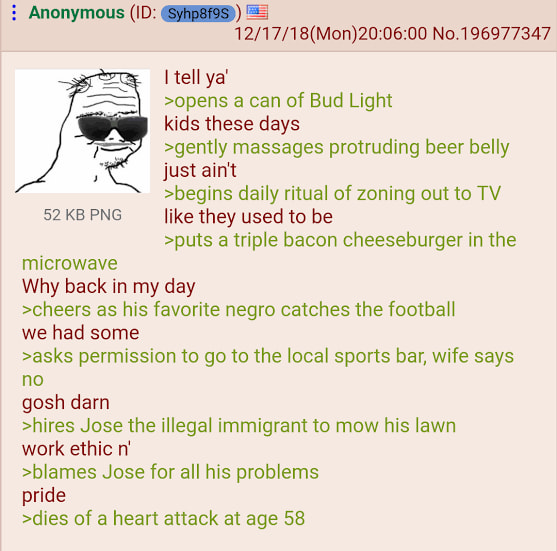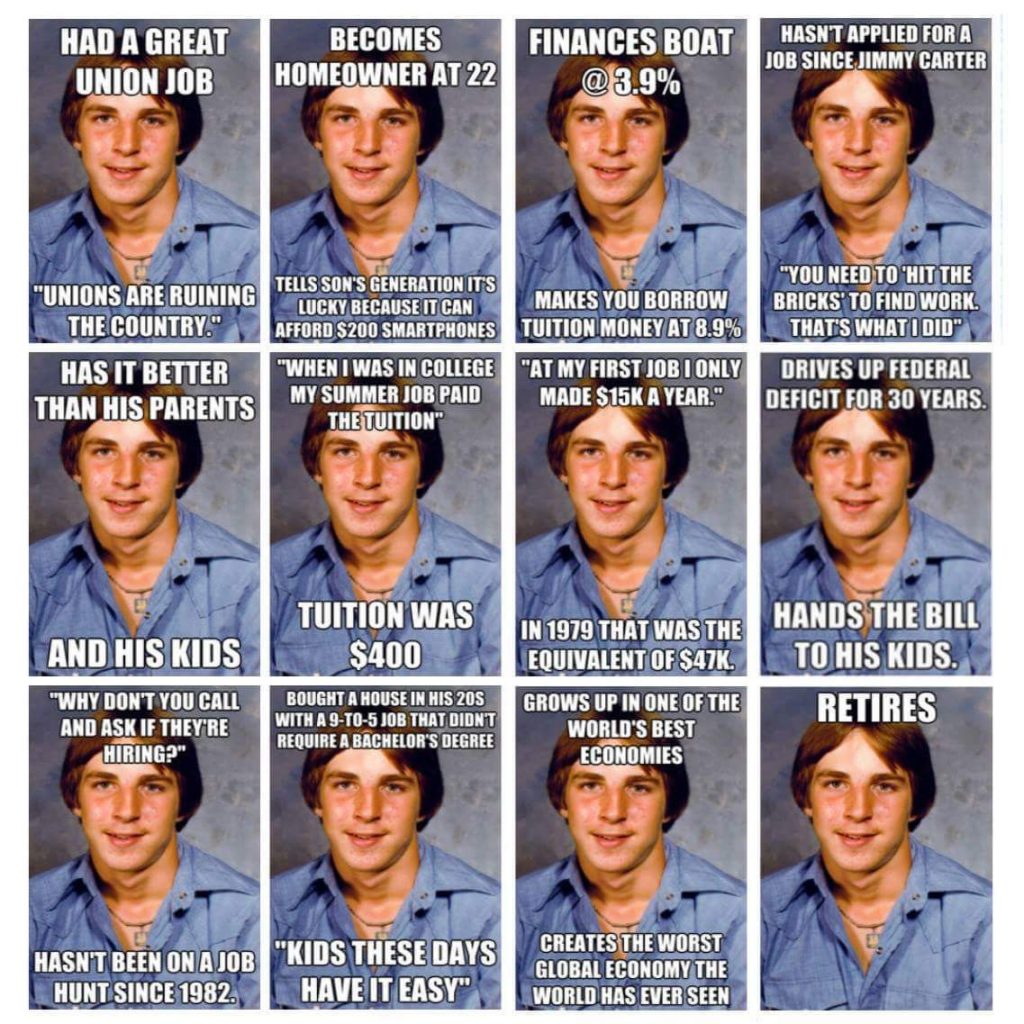Understanding The Boomer Meme

A man on the wrong side of male menopause bears a slack, satisfied grin, a can of Monster energy drink in his hand. Despite a beer belly and signs of pattern baldness, all is well in this man’s world. This is the Boomer, and this essay explains his significance in the Clown World Pantheon.
The term Boomer comes from Baby Boomer. This is a reference to the generation of people who were born immediately after World War II. Because the end of that war resulted in a temporary sharp increase in birth rates, it led to a “Baby Boom” of new children who all had unique generational features in common.
In theory, this means that a Boomer is someone born between 1945 and 1963 or so. In other words, people aged between their mid-50s to their mid-70s. This age group comprises the vast majority of high-ranking political and business decision-makers right now. The vast bulk of the world’s power, wealth and control now lies in the hands of this generation.
The Boomer meme satirises the values and attitudes that are characteristic of Boomers.
Boomers were known from the beginning to be a particularly narcissistic cohort. This was mostly a function of the great deprivations that their parents had endured during World War II and the Great Depression. The parents of the Boomers had resolved to not allow their children to suffer the same traumas they had. So they showered everything on them.
Then, as the Boomers reached young adulthood, the popular culture catered to them on account of their spending power. Music, books and movies were all crafted to appeal to Boomer values. After that, when they reached middle adulthood, the political establishment catered to them on account of their voting power. Party policy was then crafted to appeal to Boomer values.
This has led to a generation of people who genuinely believe that the whole planet revolves around them. They know nothing else than getting their own way, and they feel entitled to demand that this state of affairs should continue. They are so accustomed to luxury that they insist that the whole world work to keep them in it, even if they have to destroy everything about their countries that the following generations could have inherited.
This is the Boomer.

The central idea behind the Boomer meme is that the entire world has been set up for the benefit of this generation and that they, like spoiled children, assume that this is the way it should be and demand that it stays that way (even if following generations have to suffer).
The meme captures the frustration of those following generations, who are suffering under housing and employment markets that are leaving them with no realistic chance of ever being able to own a home, and therefore much less chance of ever raising a family of their own. Amplifying the frustration is the knowledge that young people are labouring long hours not for their own benefit, but to pay for the luxurious retirements of the Boomers.
The Boomer image is a Wojak variant. It’s really just the standard Wojak with a generation of age added on. This makes the Boomer meme a caricature of age, and not of anything else. The idea of the Boomer meme is that almost everyone in that generation thinks much the same way – smug, satisfied, and naturally unwilling to countenance any change to a system that puts their wishes at the very centre.
The meme also captures the frustrations with the Boomers themselves. The generations following the Boomers have discovered that their elders don’t give a fuck, at all, about how hard things are for young people now. It’s now widely understood that the generations following the Boomers have it harder than the Boomers themselves did, marking the first time in centuries that one generation had it harder than the preceding generation.
This is not merely a popular belief: studies have shown that life is objectively much harder now. A study by VJM Publishing showed that young people today have less than half of the house-buying power that their parents’ generation enjoyed. Even worse, the mass importation of cheap labour has destroyed any negotiating leverage those young people may have had.
The Boomers own everything, and they run the world in their interests exclusively.
The phrase “OK Boomer,” epitomises the frustration caused by this state of affairs. It’s the reaction of an exasperated young person to years and years of listening to old people bleat about how hard they worked and how they’re entitled to this or that because of how much they supposedly “paid into the system”.
It’s the younger generations’ response to decades of trying to talk about things like housing availability, the failure of neoliberalism, cannabis law reform and climate change, only to encounter millions of goat-stubborn old bastards who wouldn’t listen if the future of the world depended on it.
It’s regularly said in response to “When I was your age,” because this phrase inevitably precedes a lecture about how the young person just needs to knuckle down and work hard. Boomers, as a rule, completely fail to understand that the nature of work and of society have both changed from when they were young and that many things are much, much harder now in many major ways.
The young adults of today know that there is simply no way to get this information through the thick skulls of the average Boomer. No communication is possible with people that self-centered, ignorant and arrogant. Therefore, all that can be done is to say “OK Boomer,” as one would dismiss any other senile old fool who ought to be put out to pasture, and wait for the chance to lever their fingers from the rings of power.
The Boomer occupies a central role in the Clown World Pantheon, as he is effectively Wojak’s Dad. This means that it’s the Boomer’s personal failings that have set the scene for Wojak to become the way he is. The Boomer figure is the archetype of irresponsibility and selfish indifference to the long-term wellbeing of society. All this serves to make the Boomer cut a Zeus-like figure in Clown World.

*
This article is an excerpt from Clown World Chronicles, a book about the insanity of life in the post-Industrial West. This is being compiled by Vince McLeod for an expected release in the middle of 2020.
If you enjoyed reading this essay, you can get a compilation of the Best VJMP Essays and Articles of 2018 from Amazon for Kindle or Amazon for CreateSpace (for international readers), or TradeMe (for Kiwis). A compilation of the Best VJMP Essays and Articles of 2017 is also available.
If you would like to support our work in other ways, please consider subscribing to our SubscribeStar fund.





